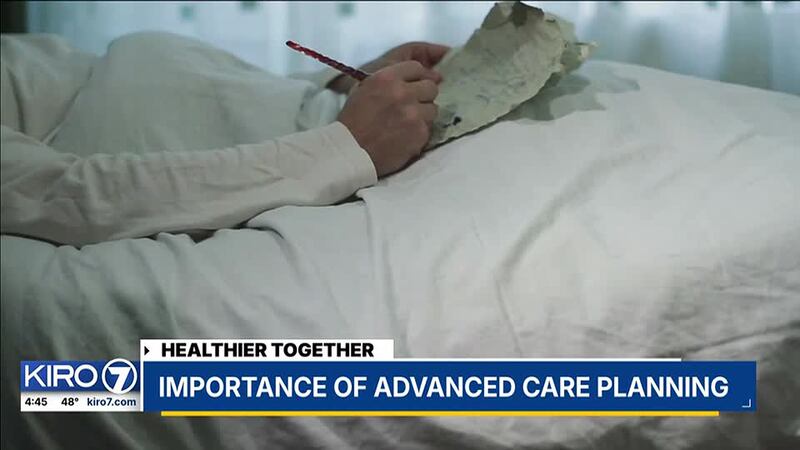SEATTLE — It’s never too early to plan for your future medical care. Advanced care planning acknowledges that we could all face health challenges later in life.
In this week’s Healthier Together, KIRO 7′s Ranji Sinha breaks down how to tackle those challenges before they even appear.
Executive Medical Director of Regence BlueShield Dr. Nicole Saint Clair spoke to KIRO 7 and detailed the situations that could require advanced planning.
“You may not be able to communicate to those around you, your medical team, and your loved ones what types of choices you would want to make,” Dr. Saint Clair said.
She knows that It’s a scary situation to be in; you’re sick, you need care, but you can’t say what you need. Dr. Saint Clair says advanced care planning handles that by taking a moment to break down those moments by giving people a plan.
“What types of medical care you would like to have if you were to be in a position where you couldn’t make those decisions at that moment, what are your health goals what are the ways that you want to experience life in your final years,” Dr. Saint Clair said.
An example that’s often cited is respiratory distress. The common scenario that most would be familiar with is if you can’t breathe and or think clearly, and you cannot make decisions. That’s where planning ahead will help you in the future.
One form of advanced care planning is a living will - a legal document telling doctors how you want to be treated. There is also the durable power of attorney for health care: a legal document that names your health care proxy who can make decisions for you.
Dr. Saint Clair says the issue of advanced care has gotten a lot more publicity of late, but taking action is still lagging.
“Only about half of people or less talk about these things with their loved ones,” she told KIRO 7. “Even when we look at folks who are older than the age of 50, we still only get up to about 60%.”
The Nation Institute on Aging also has various forms available on its website to make advanced care plans including:
Do not intubate (DNI) order: declining a ventilator.
Do not hospitalize (DNH).
Out-of-hospital DNR: tells medical personnel when to restore your heartbeat when not in a hospital.
There are also physician orders for life-sustaining treatment --POLST-- and medical orders for life-sustaining treatment or –MOLST. These are forms with guidance about your emergency medical care.
Dr. Saint Clair says all of this would be part of your medical record until you choose otherwise.
“I think it’s really important for individuals and families when dealing with difficult times, especially when they might be dealing with loss or grief to not add to that.”
©2024 Cox Media Group








